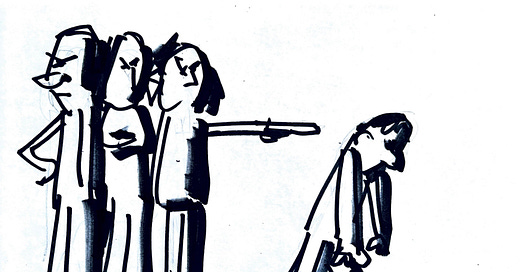Friends,
At President Biden’s State of the Union address last week, Georgia Republican Rep. Marjorie Taylor Greene repeatedly yelled “Liar!,” Tennessee Republican Rep. Andy Ogles shouted, “It’s your fault!,” and another Republican yelled “Bullshit!”
Fourteen years ago, Republican Rep. Joe Wilson was formally rebuked by the whole House after shouting “you lie” at Obama.
Yet now, anything goes.
Meanwhile, Rep. George Santos remains in Congress despite mounting revelations of outright lies, fabrications, and shady deals that years ago would have sent a member of Congress packing.
We’ve also just learned about Jared Kushner’s quid pro quo with Saudi Crown Prince Mohammed bin Salman (MBS).
As Middle East adviser to his father-in-law, Kushner gave MBS everything he wanted — Trump’s first trip abroad, permission to blockade Qatar, a pass on imprisoning leading Saudi citizens until they paid him billions and another on killing and dismembering journalist Jamal Khashoggi (as Trump later put it, “I saved his [MBS’s] ass.”).
Then, after Kushner left the White House, MBS reciprocated by putting $2 billion from the sovereign wealth fund he chaired into Kushner’s private equity company.
Where’s the shame?
Elon Musk’s concern about the dwindling number of people seeing his tweets prompted the zillionaire to convene a group of engineers last Tuesday to discover why his engagement numbers were tanking. When one of the company’s two remaining principal engineers explained it was likely due to waning public interest in Musk’s antics, Musk fired the engineer.
We used to call such behavior shameless. Now, it’s just what the rich and powerful do.
Shame once reenforced social norms. Through most of human history, survival depended on extended families, clans, and tribes. To be shamed and ostracized for violating the common good often meant death.
Charles Darwin, in his book The Expression of the Emotions in Man and Animals, thought shame may have evolved as a way to maintain social trust necessary for the survival of a group and, therefore, of its members.
In a 2012 paper, psychologists Matthew Feinberg and Dacher Keltner and sociologist Robb Willer found evidence that shame and embarrassment function as a kind of “nonverbal apology” for having done something that violates social norms. A display of embarrassment shows others that the embarrassed person is still aware of the group’s expectations and is still committed to the group’s well-being.
Four centuries ago, public shaming included scarlet A’s. “Ignominy is universally acknowledged to be a worse punishment than death,” wrote Benjamin Rush, a signer of the Declaration of Independence who also sought to put an end to public stocks and whipping posts.
A more recent version of public shaming occurred in 1954 when Joseph Welch, then chief council for the U.S. Army, stood up to Sen. Joseph McCarthy before a nationwide television audience. During a hearing in which McCarthy accused the army of harboring communists, McCarthy attacked one of Welch’s young assistants for having once belonged to the National Lawyers Guild, which McCarthy considered a communist front.
Welch responded: “Until this moment, Senator, I think I have never really gauged your cruelty or your recklessness …. Have you no sense of decency, sir?” Millions of Americans watching the proceedings from their living rooms saw McCarthy as the dangerous bully he was. By shaming him, Welch shamed America for having tolerated McCarthy and the communist witch hunt he was leading. It was the beginning of the end of McCarthy’s reign of terror.
But today, shamelessness has gained a certain elan. Audacity, insolence, and impudence are welcomed. Irreverence is celebrated. We hoot when someone gives society the bird. Many Americans love Donald Trump’s loutishness.
Meanwhile, instead of being directed at behavior that undermines the common good, shame is now often deployed against people who don’t fit in. Social media unleashes torrents of invective on people for little more than saying something silly or looking different or being socially inept. Shaming like this can cause a sensitive teenager to take his or her life.
Why are those who violate social norms now treated like Wild West outlaw heroes, while those who are different are ridiculed? Why are bullies now applauded while those at the margin are ostracized?





















Share this post